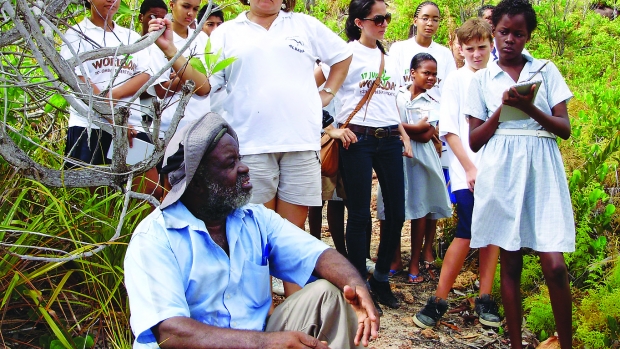Grants :: Small Grant Facilities :: Where did all the soil go? Coastal monitoring as a tool for developing local capacity, raising public awareness and assessing long-term environmental change
Where did all the soil go? Coastal monitoring as a tool for developing local capacity, raising public awareness and assessing long-term environmental change

Mr LaboudallonTRASS , Seychelles © MFF
Objectives
This project had three objectives:
- to improve understanding within the targeted communities about sustainable management of local natural resources;
- to develop and demonstrate coastal monitoring as a tool for monitoring soil erosion across different ecozones; and
- to empower local communities to take part in coastal monitoring, management and conservation
Background
Through this project, the Terrestrial Restoration Action Society Seychelles (TRASS) sought to develop capacity for and raise awareness of coastal monitoring. Five sites at Anse Possession were monitored: the Casimir River (heavily affected by soil erosion), the Pasquière River (relatively unaffected), the Baie Pasquière’s mangroves, and the lagoon in Curieuse Marine National Park. These sites were chosen to include both upstream (ridge) and downstream (lagoon) ecozones.
The project sought to develop a framework for long-term monitoring and a better understanding of environmental pressures in coastal ecosystems (especially soil erosion and run-off of toxic chemicals). It used a network of transects at the demonstration sites to monitor selected parameters and collect baseline information on ecosystem status.
Community participation was built into monitoring to enhance local understanding of coastal ecosystems, project objectives, progress and results, and TRASS activities. Public education and awareness materials were produced to target not just residents of Anse Possession but also the entire population of Praslin and other central islands.
Target beneficiaries
A network of fishing and farming communities, schoolchildren and families, tourist businesses, and other individuals.
Outputs
- Survey and sampling of selected parameters at six stations along the Pasquière and Casimir Rivers.
- Description and sampling of selected parameters at four stations in the Pasquière and Casimir mangroves, and along three transects in the Baie of Pasquière lagoon.
- Organization of public events – “Being a biologist for a day” – for families.
- Production of TRASS website, including postings of educational materials, interactive activities such as quizzes, short videos to stimulate public interest and awareness, and project materials.
- Production of a documentary, radio programmes and media articles on the impacts of unsustainable land management on the environment and livelihoods.
Accomplishments and challenges
The project helped to boost the capacity of TRASS, enabling it identify ways to address the problems identified through the baseline surveys. It also helped TRASS to build partnerships within the private sector, government and volunteers from the general public.
Both state and private international schools showed great interest in the field work, and are looking forward to the next family demonstration day. TRASS plans to continue holding family days as part of its conservation education and awareness programme, and is raising funds to sustain other aspects of the project.
Challenges
One challenge was the timing of the water quality test, especially for pH and conductivity. The test needs to be done within six hours of collecting samples, but the Public Utilities Corporation which does this only works during weekdays. So monitoring had to move to weekdays, meaning that TRASS could not engage the community (participation was planned for weekends because of people’s work commitments). TRASS resolved this problem by holding family days at weekends.
Some of the unexpected difficulties experienced during the project turned out to be opportunities. Through them TRASS gained the trust of and built partnerships with several national authorities and private businesses (such as SAA, SBS, PUC and C’est La Vie bottled water). Follow-up actions under other grants continue to enhance collaboration with the private sector.
Contributions to cross-cutting themes
Communications
TRASS developed interactive education materials and information for its website (www.trass.org.sc). A press article titled “Ridge to Reef - Where does all the soil go?” was also developed for the project launch. The project also produced information banners on the importance of rivers and soils.
Gender equality
The project sought to generate benefits for men and women, both young and old. Although fishing and farming are predominantly male occupations, the ultimate beneficiaries of those activities are families.
Climate change
The project produced information for assessing vulnerability and adaptation potential through baseline surveys and monitoring. It also stressed the need to: protect and restore ecosystems; reduce environmental pressures; promote and strengthen research and long-term monitoring of coastal ecosystems; and adapt action plans, management plans and policies to emerging and changing conditions. This approach will help to implement actions aimed at adapting to climate change.
Lessons Learned
TRASS sought to engage the community by inviting at least four participants to each monitoring session to participate in data collection. It could only cater for small groups of people because of the precarious nature of some of the sites, especially on rivers. For safety reasons and to limit any impacts on vegetation, small groups are preferable.
Project Facts
Country
Location
Anse Possession, Praslin, Seychelles
Topic
- Marine Protected Areas
- Management Assessment and Monitoring
- Sustainable Business Practices
- Climate change
- Gender equality
- Knowledge management and communications
Duration
1st Aug 2010 to 31st Jul 2011
MFF Grant Amount
US$23,200
Co-financing Partner
In-kind contributions were made by the Department of Environment and Seychelles National Park Authority, including the Curieuse Marine National Park. The Wildlife Club of Praslin Secondary School took part in activities and helped to disseminate information. Coco D’Or Hotel & Service Hotel Ltd provided co-financing and Aldo Saachi made an in-kind contribution.
Implementing Partner
Victorin Laboudallon
Elvina Henriette
Terrestrial Restoration Action Society
Seychelles (TRASS)
PO Box 4057, Praslin,
Seychelles
“The MFF project helped us to set baselines and prompted us to build links with other initiatives to take action through increased partnership, collaboration and co-financing opportunities. We are happy it worked out well for us, especially as we are now decentralizing donor-funded projects from the main island to other initiatives on Praslin!”
— VICTORIN LABOUDALLON
CHAIRPERSON, TRASS
